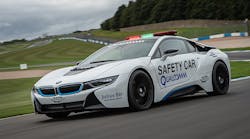Qualcomm Technologies, the research arm of Qualcomm Inc., recently unveiled the official safety car for the Federation Internationale de l'Automobile (FIA) Formula E electric vehicle-racing series. The vehicle, which emergency responders will drive to on-course incidents, is being used to demonstrate Qualcomm’s wireless charging technology. The Official Qualcomm Safety Car is a BMW i8 plug-in hybrid that has been modified to support Qualcomm’s Halo 7.2 kW wireless charging system.
The Qualcomm Halo wireless electric vehicle charging (WEVC) system provides twice the amount of power as the 3.6-kW system debuted last year, the inaugural season of the FIA Formula E racing series. This system uses the principles of resonant magnetic induction to transfer energy with high coupling coefficients and low system currents, according to Qualcomm Technologies. During the Formula E series, the Safety Car will be positioned at the end of the pit lane, standing over a ground charging pad that can fully replenish the vehicle’s 7-kWh lithium-ion battery in about an hour, the company says.
Qualcomm also sponsors one of the vehicles entered in the FIA Formula E racing series. (Image courtesy of Edvvc via Creative Commons and edited from the original by Electronic Design).
Although wireless charging is currently limited to the space where an electric vehicle is parked, Qualcomm is preparing for its widespread deployment. Steve Pazol, general manager of wireless charging at Qualcomm, envisions a future where charging pads could be installed in roadways and at intersections. Electric vehicles could be charged wirelessly while driving down the street, eliminating the need for drivers to plug in their vehicles.
The FIA Formula E championship is a fully electric racing series that serves as a framework for research and development around the electric car. It operates as an open championship, giving manufacturers an opportunity to develop and test electric powertrain and battery technologies. Alejandro Agag, CEO of the Formula E racing series, has said that its purpose is not only to make electric vehicles more accessible to people, but also to filter new technologies into the commercial market.
The Formula E series is entering its second season, with the first round taking place in Beijing later this month. Last season, all ten teams were required to use identical single-seater vehicles. The cars were designed by Spark Racing Technology. They use electric powertrains and electronics from McLaren Automotive and 200-kW, 270-bhp lithium-ion batteries from Williams Advanced Engineering. Renault, along with its Renault Sport Technologies and Renault Sport F1 programs, was in charge of the systems integration.
Qualcomm was one of the founding members of the Alliance for Wireless Power (A4WP), the organization that developed the Rezence wireless charging standard, one of the two major standards in the industry. Earlier this year, the Rezence specification was upgraded to support wireless charging through metal objects, which Qualcomm introduced into its WiPower wireless charging technology for smartphones and other devices.


